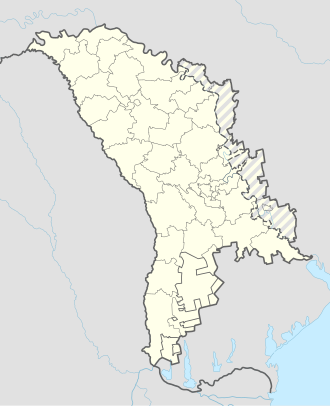Durlești | |
|---|---|
Town | |
 St. Nicholas Church in Durlești | |
| Coordinates: 47°02′N 28°57′E / 47.033°N 28.950°E | |
| Country | Moldova |
| Municipality | Chișinău |
| Government | |
| • Mayor | Eleonora Șaran (CUB) |
| Population | |
• Total | 26,308 |
| Time zone | UTC+2 (EET) |
| • Summer (DST) | UTC+3 (EEST) |
| Postal code | MD-2003 |
| Website | Official website= |
Durlești (Romanian pronunciation: [durˈleʃtʲ]) is a town in Chișinău municipality, Moldova. Located on the northwestern outskirts of the capital, contiguous with the Buiucani sector, it is the largest of Chișinău’s suburbs.
History
Archaeological excavations indicate that the area of present-day Durlești has been inhabited since the early centuries of the 2nd millennium CE, with evidence of stable medieval settlements. The locality as known today developed from two earlier settlements — Cartușa and Durlești.
An early reference dates to 7 April 1636, mentioning a land grant held by Magda, daughter of a certain Drulea-Spătar, from Voivode Ștefan. The village, originally called Drulești, shared its name with another settlement in the Romanian lands — for example, a document by Voivode Ștefan Tomșa mentions “Ionașco from Drulești” in Roman County — which can complicate interpretation of historical sources. While the settlement was previously believed to exist since 1721, during Mihai Racoviță’s reign (Statistical Dictionary of Bessarabia, 1923), the earliest confirmed record dates to 1 June 1656, when Voivode Gheorghe Ștefan issued a charter confirming land purchases by Onofrei and Ionașcu Bucșan.
Demographics
According to the 2024 census, 26,308 inhabitants lived in Durlești, an increase compared to the previous census in 2014, when 17,210 inhabitants were registered.[2][3]
- Moldovans[a] (77.3%)
- Romanians (17.7%)
- Russians (1.70%)
- Ukrainians (1.70%)
- Others (1.50%)
| Year | Pop. | ±% |
|---|---|---|
| 1989 | 17,807 | — |
| 2004 | 15,395 | −13.5% |
| 2014 | 17,210 | +11.8% |
| 2024 | 26,308 | +52.9% |
- ↑ There is an ongoing controversy regarding the ethnic identification of Moldovans and Romanians.
- ↑ In March 2023, the Parliament of Moldova passed a law updating all legislative texts and the constitution to refer to the national language as Romanian, effectively rendering the term "Moldovan" obsolete.[4][5]
Notable people
- Vladimir Bodescu (1868–1941), Bessarabian politician and lawyer who voted for the Union of Bessarabia with Romania
- Petru Buburuz (born 1937), Orthodox parish priest and politician, served in the Supreme Soviet of the Soviet Union and officiated the blessing of the Grand National Assembly in 1989
International relations
Twin towns – Sister cities
Durlești is twinned with:
 Blaj, Romania
Blaj, Romania
References
- ↑ Results of Population and Housing Census in the Republic of Moldova in 2014: "Characteristics – Population (population by communes, religion, citizenship)" (XLS). National Bureau of Statistics of the Republic of Moldova. 2017. Retrieved 1 May 2017.
- ↑ "Rezultatele finale ale Recensământului Populației și Locuințelor 2024: Caracteristici etnoculturale ale populației". National Bureau of Statistics of the Republic of Moldova. (in Romanian)
- ↑ "2014 Moldova Census of Population and Housing". National Bureau of Statistics of the Republic of Moldova. (in Romanian, Russian, and English)
- ↑ "Chisinau Recognizes Romanian As Official Language". Radio Free Europe/Radio Liberty. 5 December 2013. Archived from the original on 23 September 2016. Retrieved 11 March 2014.
- ↑ "Moldovan parliament approves law on Romanian language". Reuters. 16 March 2023. Retrieved 11 July 2024.



